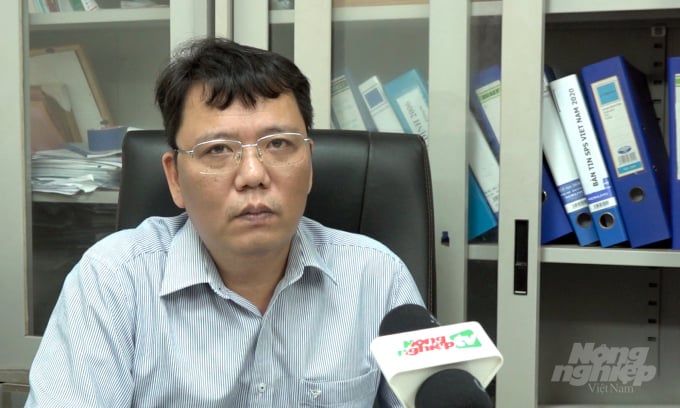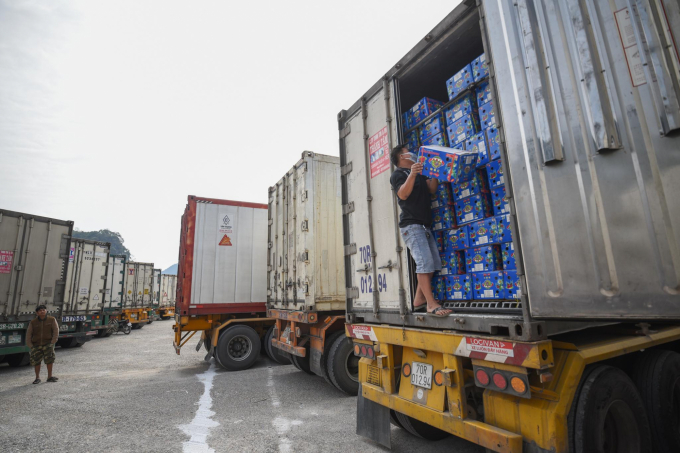May 30, 2025 | 18:20 GMT +7
May 30, 2025 | 18:20 GMT +7
Hotline: 0913.378.918
May 30, 2025 | 18:20 GMT +7
Hotline: 0913.378.918
In April 2021, the General Administration of Customs of China issued Decree 248 on the "Regulations on the Registration and Administration of Overseas Producers of Imported Food" and Decree 249 on the "Administrative Measures on Import and Export Food Safety". These two Decrees take effect from January 1, 2022. Foreign enterprises, including Vietnam, who want to export to the Chinese market, must comply with new regulations.

Mr. Ngo Xuan Nam, Deputy Director of Vietnam SPS. Photo: Bao Thang.
Vietnam SPS is the focal point for aggregating notifications from WTO member countries, which may affect Vietnam's agricultural exports. In May 2021, Vietnam SPS sent translations of Decrees 248 and 249 to the Departments of Agriculture and Rural Development in 63 provinces and cities and relevant ministries, departments, and agencies.
At the end of September 2021, the General Administration of Customs of China continued to issue Note 353 to guide the procedures, time, and validity of registration for exporters. Based on this note and two Decrees, Vietnam SPS has provided detailed instructions to businesses, hoping that export activities will keep fluently as soon as Decrees 248 and 249 take effect.
For the food safety management and supervision system, China will set up a regime to inspect and evaluate the situation of food safety management in foreign countries (including national and enterprise systems); supplementing methods of inspection, assessment, management of foreign business registration, ensuring traceability and product recall according to supervision requirements; requires urgent responsibility of the regulatory authorities of the exporting country.
For the competent authority of the exporting country, specify the procedure and detailed content of the risk assessment and the time limit for handling, suspending, or canceling the risk assessment.
For enterprises, assign the primary responsibility of foreign enterprises in the food import chain and assign the obligation of self-control to the importer; simultaneously, it adds the duty to comply with regulations on changing regulatory registration documents, detailed requirements on food labeling, and additional regulations sanctions in case of violation.
Decrees 248 and 249 also emphasize increasing control regulations, including the sampling rate of imported food products. In addition, enterprises must register when producing and exporting 18 food groups to the Chinese market. Products that do not fall into this group of 18 enterprises will submit their registration documents or entrust an agent.
This point is the most basic, most important issue that businesses need to know. According to Vietnam SPS, 5 Departments under three ministries include the Department of Plant Protection, The National Agro-Forestry-Fisheries Quality Assurance Department, the Department of Animal Health (Ministry of Agriculture and Rural Development), Food Safety Department (Ministry of Health), and the Department of Science and Technology (Ministry of Industry and Trade) have the authority to register and compile an exporter list to send to the General Administration of Customs of China.
Suppose the above-specialized Departments have a local sub-department system and authorize business registration in their localities to the Sub-Departments. In that case, enterprises can register through the Sub-Departments, before the Sub-Departments send to 5 Departments: the Department of Plant Protection, the National Agro-Forestry-Fisheries Quality Assurance Department, the Department of Animal Health (Ministry of Agriculture and Rural Development), Food Safety Department (Ministry of Health), and the Department of Science and Technology (Ministry of Industry and Trade). The Sub-department is responsible for guiding enterprises to fill in the correct form required by the General Administration of Customs of China.
If not through sub-departments, businesses can send via online directly to the above 5 Departments' portals. If companies still have questions, they can access the website of Vietnam SPS at the link: http://www.spsvietnam.gov.vn/, call the hotline number: (084)-024-37344764, or fax to: (084)-024-373 49019.

Foreign enterprises, including Vietnam, who want to export to the Chinese market, must comply with new regulations. Photo: Bao Thang.
Decree 249 on the "Administrative Measures on Import and Export Food Safety" requires Vietnamese management agencies to closely monitor and take responsibility for food safety issues.
Therefore, for products under the management of 2 or more Ministries, Vietnam SPS instructs businesses to send documents to one of the three Departments under the Ministry of Agriculture and Rural Development.
If the product is under the management of 2 or more Departments under the Ministry of Agriculture and Rural Development, the enterprise shall submit the registration to the National Agro-Forestry-Fisheries Quality Assurance Department.
For enterprises exporting four types of products: meat, meat preparations, aquatic products, milk, bird's nest, and preparations from bird's nest, enterprises' registration continues to be valid. For enterprises exporting to China for the first time, the Administration of Customs of China will evaluate and verify the exporting country's food safety situation with the food safety management system and determine the corresponding testing and quarantine requirements.
For enterprises exporting 14 products: intestines; bee products; eggs and egg products; cooking oil and oil; stuffed flour; edible cereals; industrial cereal preparations and malt; fresh and dehydrated vegetables; dried beans; spice; nuts and seeds; dried fruit; unroasted cocoa beans and coffee beans; specific dietary foods and health-protecting foods, the competent authorities of Vietnam synthesize from January 1, 2017, up to now and send them to Bureau of Import and Export Food Safety (the General Administration of Customs of China). country) before December 31, 2021, an enterprise list according to the respective forms.
Before November 1, businesses that register for the five agencies under three ministries will receive preferential procedures. Specifically, companies only need three documents: business registration, food safety, and commitment. Registration before November 1 is like a business holding a place to export to China. If this deadline is met, the enterprise will be extended the deadline for completing the application to June 2023.
Conversely, enterprises registered from November 1 to December 31 will have to carry out registration procedures as prescribed in Article 8 of Decree 248.
According to the provisions of Decree 249, exporting enterprises will have to print their business identification numbers and related information on the packaging. This code must not be cut and pasted but must be printed directly, both inside and outside the packaging, down to the smallest inseparable part of the package. The export enterprise code will be issued by the General Administration of Customs of China and notified to the competent authorities of Vietnam in the upcoming time.
The product's outer packaging must have a strong, clear, legible mark in Chinese/English or Chinese and the exporting country (region). Required information includes: exporting country, product name, manufacturer's registration number, production batch number, outer packaging must have specifications, production place (specific to district/province/city), and the destination must clearly state as the People's Republic of China, and have the quarantine stamp of Vietnam's competent authority.
According to Vietnam SPS, it is not the first time China controls the records of enterprises exporting to this market. Enterprises must actively import materials with traceability and be certified by competent authorities.
In addition, businesses need to pay attention to and regularly update records and diaries. The Chinese side can conduct a field inspection or a random online inspection. If not met, the enterprise may be crossed out from the exporter list.
As per the new regulations, the time limit for enterprises to be licensed to export to the Chinese market is five years. Between 3-6 months before the license expires, businesses need to renew their registration actively. If you skip this step, you will have to re-register.
Translated by Ha Phuc
/2025/05/29/5625-12-214801_567.jpg)
(VAN) Provincial mergers in the Mekong Delta promise to streamline administration, expand inter-provincial raw material areas, and foster close linkages in agricultural value chains, benefiting both businesses and cooperatives.

(VAN) Merging Mekong Delta provinces contributes to the expansion of agricultural raw material areas, addressing previous constraints caused by provincial boundaries. Additionally, this expansion will reduce costs and strengthen linkages between businesses, cooperatives, and farmers.
/2025/05/29/1043-2-153730_145.jpg)
(VAN) The Government's policy to merge provincial-level administrative units opens up major opportunities for the Mekong Delta region to reshape its agricultural development strategy toward large-scale production, effective regional linkages, and sustainability.

(VAN) The mutual export of agrifood products between the European Union (EU) and the United Kingdom (UK) must occur again without certification, border controls or other red tape. This was agreed at the UK-EU summit.
/2025/05/22/5121-2-173645_677.jpg)
(VAN) NBSAP Tracker identifies strengths and areas for improvement in the National Biodiversity Strategy, based on each region’s priorities and capacities.

(VAN) The draft amendment to the Circular on rice export trading stipulates a periodic reporting regime for rice exporting enterprises.

(VAN) Dong Thap farmers attained an average profit margin of 64% during the summer-autumn 2024 crop (first season), while An Giang and Kien Giang farmers followed with 56% and 54%, respectively.